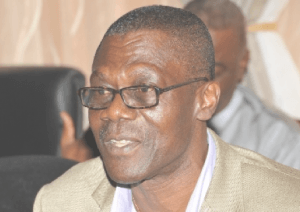Africa records 82 terrorist incidents in March – ACSRT Report

The African Centre for the Study and Research on Terrorism (ACSRT) has noted that, the continent recorded 82 terrorist attacks across the Region between March 16 and March 31, 2019.
Lieutenant Colonel (rtd) Larry Gbevlo-Lartey, African Union Special Representative in charge of Counter-Terrorism Cooperation and also the Director of the Algiers, based African Centre for the Study and Research on Terrorism (ACSRT) has said.
The period under review recorded 544 terrorism related deaths out of which, 415 resulted directly from terrorist attacks, where as 129 were deaths recorded during counter-terrorism operations by security forces.
The African Centre stated in a Bi-weekly publication “Africa Terrorism Bulletin,” made available to the Ghana News Agency in Accra by Mr Richard Apau, Information and Technology Officer of African Centre for the Study and Research on Terrorism of the African Union Commission.
The Africa Centre is to provide a fortnight assessment of terrorism and violent extremism situation and trends on the continent and provide African Union Member States up to date information on terrorism incidents and its related activities.
According to the report, the Sahel region recorded 57 out of 82 incidents of terrorist attacks. 79 per cent of civilian, 62 per cent of military and 66 per cent of terrorists’ deaths occurred in the Sahel region.
It also revealed that 62 per cent (344) of those who died across the continent were civilians, whereas terrorists were 27 per cent (149). Military/Security forces accounted for 11 per cent (61).
In 54 out of the 82 attacks, the terrorists used Small Arms and Light Weapons (SALW); 15 attacks involved the use of Improvised Explosive Devices (IEDs), one attack involved a mixture of IEDs and SALW, and 12 cases of kidnappings were recorded.
According to the African Centre, five kidnappings occurred in the Soum province of Burkina Faso, three in the Anglophone regions of Cameroon, two in Nigeria and one in Mali.
In all, 140 people were taken hostage, five killed, 106 released, and 29 remained in hostage.
The report revealed that 57 of the attacks targeted civilians, 16 targeted security forces, seven-targeted Government Institutions/Officials, and two targeted International Organisations.
In terms of casualties suffered by the terrorist groups, Boko Haram lost 80 members whereas Al-Shabaab lost 48 members during Counter Terrorism operations.
Another 21 persons belonging to unidentified or unaffiliated groups were also killed during counter-terrorism and counter-insurgency.
The five countries most affected by terrorism during the period are; Mali, Somalia, Niger, Burkina Faso and Nigeria.
Countries of the Sahel region in West Africa recorded a total death of 400 out of the 544 representing 74 per cent of the terrorism related deaths for the period.
Out of the number, 264 were civilians, 98 terrorists, and 38 security personnel.
The report said the daring nature of the attacks, in spite of Counter-Terrorism efforts by the Security Forced, is an indication of the viability and capability of the terrorist groups to continue to operate.
The review of the situation reveals a deterioration of security, safety, and stability in the Sahel region. Mali is faced with the proliferation of Violent Extremist groups with varied motives and the ease with which small arms and light weapons could be acquired in the Sahel region contributed to the daily attacks and atrocities committed.
According to the report, a number of political, socio-cultural and economic factors still made conditions conducive for the spread of terrorism and violent extremism across the Sahel belt.
The African Centre acknowledged that, while there was the need to do more to support the Counter-Terrorism operations in order to improve security and stability, a human security response approach should inform military concepts of operation.
The report said protection and empowerment of local communities should be prioritized in other to ensure their resilience.
It said the lack of opportunities for young people, political impunity, exclusion, marginalization, effects of climate change/competition for scarce resources and under-development were all concerns which if not addressed, in local communities, present a high risk of further escalation that could lead to the commission of more atrocities.
The African Centre was established as a structure of the African Union in 2004 as part of the AU Plan of Action to Prevent and Combat Terrorism; and assist AU member States build their Counter-Terrorism capacities.
Its mandate included; the conduct of research, analysis and studies on the terrorism situation and terrorist groups in Africa, maintaining a terrorism database, centralizing information on terrorism and sharing this with AU Member States.
The African Centre conducts assessment missions to various AU Member States in order to ascertain their Counter-Terrorism capability and compliance with International Legal instruments and then provides advice on what needs to be done.
In its capacity building effort, the African Centre conducts seminars, workshops and training sessions in various aspects of Counter-terrorism for Member States and facilitates the drafting of their Counter-Terrorism legislation, strategies and Plans of Action in accordance with human rights requirements.
Source: GNA
